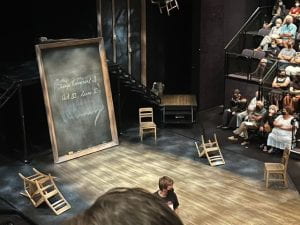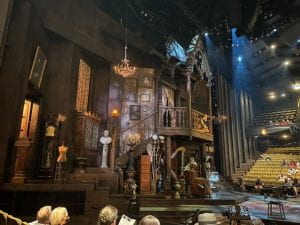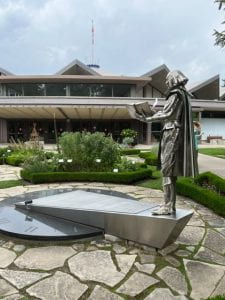The particulars of the Advanced Placement course in African American Studies are not published yet, but it is apparent that the State of Florida will have a resounding impact on what passes for African American Studies in the country.
As presented, the content of this course is inexplicably contrary to Florida law and significantly lacks educational value,” the department’s office of articulation, which oversees accelerated programs for high school students, wrote on Jan. 12. In the future, should the College Board “be willing to come back to the table with lawful, historically accurate content, FDOE will always be willing to reopen the discussion.
[https://www.nytimes.com/2023/01/19/us/desantis-florida-ap-african-american-studies.html?action=click&pgtype=Article&state=default&module=styln-us-schools&variant=show®ion=MAIN_CONTENT_1&block=storyline_top_links_recirc]
What did the Department of Education of Florida object to, and how will it change the content of the Advanced Placement Course in African American Studies? This degree of regulation should be anathema to freedom-loving Republicans, but we will probably learn that, in the case of public school curricula, they are happy to restrict public familiarity with writers they don’t agree with. And in a state with a disproportionate number of senior citizens appalled by the changing mores of race and gender in the 21st Century.
The AP Placement Test regulators will seriously consider whatever limitations the department of education of a massive state wants to impose. Their response to the rejection of the Florida Department of Education:
The process of piloting and revising course frameworks is a standard part of any new A.P. course, and frameworks often change significantly as a result,” the College Board said in a statement.
The Chief Executive Officer of the College Board, David Coleman, made an appearance on PBS Wednesday night (the beginning of Black History month), insisting that all revisions to the AA curriculum had been made before Governor DeSantis and the Stop WOKE Act had been applied to the framework. He insisted that the readings listed for the course were all optional and that the College Board would welcome whatever readings AP teachers brought to the course.
It is a little ingenuous to claim that all contributions to AP African American Studies are welcome, when the outcomes are evaluated by an AP Test designed and assessed by the College Board. The power wielded by the administrators of a test is considerable. The Florida Department of Education recognizes this, and they have already taken a sharp instrument to the African American frameworks.
What the College Board and the FDOE neglect to admit is that the elimination of certain authors or topics at the top of the secondary curriculum will essentially eliminate related authors and topics from the curriculum below the Advanced Placement level, not only for the students of Florida, but for the rest of the country that bases its African American studies objectives on the objectives set by the College Board.
Governor DeSantis indignantly objected to the AP topic of “Black Queer Studies,” because he thought it irrelevant to African American Studies. He obviously is not familiar with
- James Baldwin, a gay man whose Go Tell It On the Mountain was one of 100 best English-language novels released from 1923 to 2005.
- Charles Blow ( A gay New York Times columnist, his memoir, now a play – Fire Shut Up in My Bones)
- Alice Walker (Her Pulitzer Prize-winning The Color Purple with prominent gay characters)
These authors use their own experiences to reveal discriminations against race and gender within the same work. Because some censors, such as activist parents and the FDOE, do not accept homosexuality in their culture, these prominent authors could be banned from reading lists of the most advanced students in Florida.
The FDOE also called out the Black feminist bell hooks, author of Ain’t I a Woman?. Her indictment of the “white supremacist, capitalist, patriarchy” raised objections from the state reviewers. That critique did not seem suitable to the topic “Black Study and Black Struggle in the 21st Century.” Does this also threaten the study of August Wilson’s Fences and The Piano Lesson, Pulitzer Prize-winning plays exposing racial struggle, or the study of Ta-Nehisi Coates, a frank critic of racism in his childhood memoir Between the World and Me? What about the racial and gender overtones of Nobel Prize-winning author Toni Morrison (The Bluest Eye and Beloved)? Where should students hear the voices of dissent–on Netflix and the street corners?
These authors wrote to unsettle their readers, Black and White, and left their writing on the chopping block for those who don’t want to be “uncomfortable.” Teachers of African American Studies could make such authors mileposts of their curricula, but their writing is vulnerable to the indiscriminate (or discriminatory) whims of the Florida Department of Education.
What we are witnessing is the wholesale whitening of the secondary school curriculum. The censoring of the highest levels of literacy permeates the literacy of grades 6-11. The very essence of Blackness is under attack by a minority of White guardians of public schooling. Advanced Placement teachers in Florida will be censored, and the ripples will spread to AP curricula and curricula in the lower grades across the country.
Who has the prominence to check the indiscriminate claw of Ron DeSantis? Where will the purge of Black authors end?











